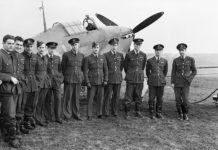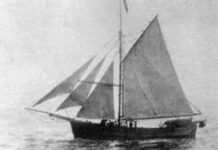German submarines patrolled the east coast of North America, sinking merchant and military vessels in WW Two.
Sailing between New York City and Newfoundland, the Steam Ship Liverpool Packet was on its usual route on early morning of May 31, 1942. Captain Norman E. Smith and his crew of 20 had no idea that a menace was lurking under the dark waters of the Atlantic Ocean. The enemy stayed low, biding their time for the opportune moment.
Liverpool Packet was Unescorted
The SS Liverpool Packet was sailing solo, the voyage unescorted by military ships. Fifteen miles away from Seal Island “and only 30 miles from Captain Norm’s native Woods Harbour when, without warning, it was torpedoed by an undetected Nazi U-boat.,” said Andrew W. Smith in “Nova Scotia’s and Captain Norm’s Second World War” on The 14th Colony. “The torpedo tore through the entire engine room.” Below decks, the two engine room firemen were killed directly. The ship suffered an enormous blast hole and began to sink into the cold water.
Crew rushed aboard the lifeboat; others swam for their lives. The SS Liverpool Packet disappeared and its cargo disappeared into the depths. But the German threat was not yet over. The submarine surfaced.
Nazi Captain Schultze
“Its crew emerged and trained their guns on the Packet men,” said Smith. Nazi Kapitanleutnant Heinz-Otto Schultze questioned Captain Norm Smith about his freight and destination. Satisfied with the answers and the damage inflicted, the U-boat crew departed. On their way to shore, the Canadians heard shouts for help. An officer had been blown off the ship into the seas during one of the blasts and was clinging to debris. Rescued by his crewmates, he was hauled up into the safety of the lifeboat. Except for the two engine room men, the crew of the Packet lived to sail another day.
Canadian Captain Norman Smith
Joining the merchant navy before he was a teenager, seafaring was in the blood of Captain Norman Emmons Smith, born at Woods Harbour Nova Scotia in 1880. Smith earned his way up the ranks to become the Master of Canadian Navy and merchant ships in World War One and World War Two. When the Liverpool Packet was torpedoed on the last day of May 1942, Smith was experienced and capable at 59 years old. Surviving the War, Smith lived to an old age, passing away in his 80s.
The enemy commander was an experienced officer as well. Heinz-Otto Schultze was born in 1915 in the city of Kiel, Schleswig-Holstein, Germany. His father was a decorated U-boat commander in the First World War. Joining the German navy at age 19, Schultz quickly climbed up the ranks. “After almost two years as watch officer on U-31 he commanded school boats in 1940 and 1941 before commissioning U-432 in April 1941.” A top U-boat ace, according to Uboat.net’s “The Men – The Commander” listing, Schultze was awarded several decorations: the Knight’s Cross, the Iron Cross (1st and 2nd Class) and a U-Boat War Badge. He was credited with the sinking and damaging of 22 Allied vessels in 1941-1942.
During a battle in the South Atlantic in November 1943, Schultze’s submarine was sunk by depth charges issued by an American aircraft. All hands were lost, including Captain Schultze.
SS Liverpool Packet Built 1926 England
The Liverpool Packet was built in 1926 by Swan, Hunter & Wigham Richardson Limited in England. First owned by a Norwegian merchant fleet, two years later the ship was sold into the fleet of Delson Steamship Company Ltd. in Montreal. Changing hands again, the ship was dubbed Sonia, owned by Sonia Shipping in Nova Scotia. Renamed the SS Liverpool Packet in a final sale, the vessel belonged to Markland Shipping of Halifax, Nova Scotia.
Weighing 1,188 tons, the Liverpool Packet was powered by a triple-expansion engine, states Wrecksite in “SS Liverpool Packet (+1942).” At the time the ship was torpedoed, it was carrying a payload of 1,945 tons.
Before and after the sinking of the SS Liverpool Packet, dangers prowled the coastal waters of Canada. Lives were lost, cargo destroyed, as many ships were damaged or sunk by U-boats near the Maritimes during WW Two.







